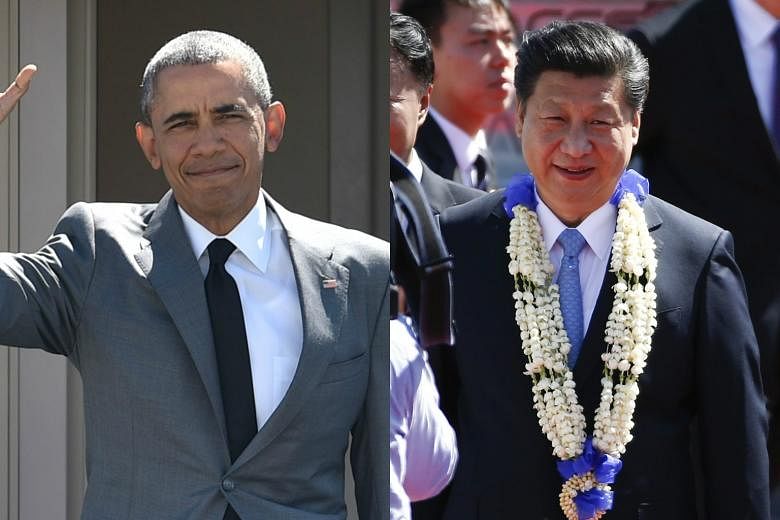MANILA - A rivalry between the United States and China for economic and political clout in Asia will soon play out, as leaders of the world's two most powerful nations descend on Manila for a two-day summit of Pacific Rim leaders.
US President Barack Obama and Chinese leader Xi Jinping arrived in the Philippines late Tuesday morning (Nov 17), with agendas that will likely see them jockeying for influence among leaders of the Asia-Pacific Economic Cooperation (Apec) forum encompassing a region of over three billion.
While Beijing has won concessions to keep disputes over the South China Sea off the official programme, Mr Obama will likely discuss the friction over the volatile region and military relations when he meets with the Apec host, President Benigno Aquino, on Wednesdday (Nov 18) and Japan's Prime Minister Shinzo Abe on Thursday on the sidelines of the Apec summit.
China insists it has sovereign rights to nearly all of the 3.5 million sq km South China Sea, even waters that are 1,611km from its coasts and nearer its smaller neighbours.
Tensions have escalated, after China stepped up its land reclamation efforts in the Spratly archipelago, where it has so far created islands with airstrips and mall-size garrisons on seven reefs it occupies.
To showcase US commitment to help its other allies in the region grappling with growing Chinese assertiveness, Mr Obama is scheduled to board on Tuesday afternoon the BRP Gregorio del Pilar, a former US Coast Guard cutter the Philippines acquired in 2011 and now uses as navy flagship.
Securing this detour is the US Navy's Arleigh Burke-class, guided missile destroyer USS Fitzgerald, which has been deployed on a five-day "support mission" for the Apec summit.
Mr Obama and Mr Xi will also be squaring off over separate trade agreements: the US-backed Trans-Pacific Partnership (TPP), and the China-sponsored Free Trade Area of Asia Pacific.
In meetings with more than a half-dozen world leaders and in a speech to business leaders, Mr Obama plans to make his case that passage of the TPP is critical to the region's economic health.
"They will celebrate the achievement of that agreement," Mr Matthew Goodman, a specialist in Asian economics at the Centre for Strategic and International Studies in Washington, told The New York Times.
"Economics is strategy. And if that's true, then the president is heading out on this whirlwind trip in a very strong position."
Analysts say Mr Xi, on the other hand, is facing headwind in Manila.
"The US image in the region is again on the rise, and China's has taken a bit of a battering due to its actions in the South China Sea, the slowing growth of its economy," said Mr Malcolm Cook of the Institute for South-east Asian Studies in Singapore.
One area that Mr Obama and Mr Xi are likely to agree on is the need to step up efforts to clamp down on the growing threat of Islamist militants to the region.
Groups with ties to the Islamic State of Iraq and Syria are said to be coalescing for a formal South-east Asia branch,
The US is reportedly pushing for a strongly worded response to Friday's attacks in Paris that killed at least 129 people at the end of the Apec summit.
Mr Xi has called the attacks "barbaric".


